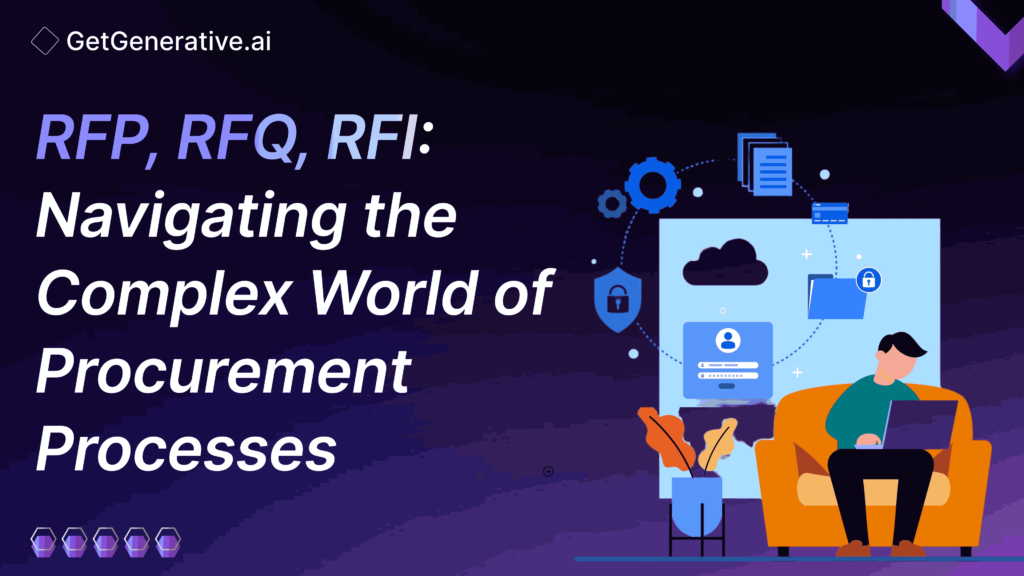RFP, RFQ, RFI: Navigating the Complex World of Procurement Processes
The procurement process stands out as a critical function in the intricate web of modern business operations. This process ensures businesses acquire the necessary goods and services to operate effectively, optimizes spending, and fosters strong vendor relationships. As businesses increasingly rely on efficient procurement strategies to maintain competitiveness and profitability, understanding the tools at their disposal becomes paramount. These tools include the Request for Information (RFI), Request for Quote (RFQ), and Request for Proposal (RFP), each serving a unique purpose and fitting different scenarios.
According to a recent survey by Deloitte 79% of business leaders identify cost reduction as the most critical focus of their procurement strategy. However, modern procurement is about cutting costs, finding value, and innovating through supplier capabilities. Another report by McKinsey found that companies that excel in procurement practices can boost their total revenues by up to 2% annually, solely through strategic sourcing and supplier management.
This growing emphasis on procurement efficiency underscores the importance of choosing the right procurement method. Whether gathering preliminary information with an RFI, seeking the best price with an RFQ, or soliciting comprehensive project proposals with an RFP, each tool is crucial in enhancing procurement outcomes. In this blog, we will delve into the specifics of RFI, RFQ, and RFP, examining when and why companies should utilize each to optimize their business processes and achieve better procurement results.
Understanding RFI (Request for Information)
An RFI, or Request for Information, is a foundational tool in the procurement process. It primarily gathers essential information from potential suppliers about their capabilities, products, and services. This tool is pivotal in the early stages of procurement when a company seeks to understand what’s available in the market.
Purpose of an RFI:
- To collect general information that helps define project scope and requirements.
- Evaluate a supplier’s ability to meet the company’s needs before advancing to more detailed inquiries.
Typical RFI Contents:
- Company background and project introduction.
- Request general information on suppliers’ capabilities, technologies, and business standards.
- Queries about compliance with industry-specific regulations and standards.
Benefits of an RFI:
- Facilitates broad market analysis and identifies potential suppliers.
- Helps refine procurement strategy by clarifying the market landscape and technological possibilities.
When to Use an RFI:
- Ideal when entering a new market or when details about available solutions are unclear.
- Useful in technology sectors where rapid innovation may affect available options and supplier capabilities.
Also Read – What Is RFP and How to Navigate It
Exploring RFQ (Request for Quote)
An RFQ, or Request for Quote, is a procurement tool used when the requirements are clear, specific, and detailed. It is primarily used to solicit competitive prices from potential suppliers for well-defined items or services.
Core Elements of an RFQ:
- Detailed description of the goods or services, including specifications, quantities, and delivery schedules.
- Pricing sheet format for suppliers to fill out, ensuring uniformity in responses.
Advantages of Using an RFQ:
- Enables quick comparison of prices across different suppliers.
- Streamlines the selection process by focusing on cost and deliverability, often the primary decision-making factors.
Situations Favoring an RFQ:
- When purchasing standard items like office supplies or bulk materials where specifications are not subject to interpretation.
- Ideal for repetitive purchases where the buying criteria are established and only the price needs confirmation.
Diving into RFP (Request for Proposal)
An RFP, or Request for Proposal, is used for complex procurement needs where the decision goes beyond price, requiring a detailed examination of various vendors’ proposed solutions and methodologies. This tool is essential for strategic investment projects and significantly impacts the company’s operations.
Key Components of an RFP:
- Comprehensive project overview and scope of work.
- Specific requirements for the proposal, including desired outcomes, timelines, and milestones.
- Criteria for evaluation may include technical capability, cost, vendor experience, and innovative approaches.
Importance of an RFP:
- Allows companies to assess not just the cost but the overall value proposition of each vendor.
- Facilitates strategic procurement by enabling creative solutions and methodologies that may be proposed by vendors.
Optimal Use Cases for an RFP:
- Suitable for large-scale projects involving technology implementations, construction, or consultancy services.
- When the project requires a unique solution or customization that necessitates a thorough proposal from each vendor.
Explore – Salesforce RFP Templates
Comparative Analysis: RFI vs. RFQ vs. RFP
| Feature | RFI | RFQ | RFP |
| Purpose | Gathers general information about suppliers’ capabilities or market conditions. | Solicits specific price quotes based on detailed requirements. | Requests detailed proposals for complex projects, focusing on comprehensive solutions and value. |
| Primary Focus | Information gathering and preliminary market research. | Price and direct cost comparison. | Total value assessment, including quality, cost, and innovation. |
| When to Use | Early in the procurement process, when exploring new markets or services. | When product/service specifications are clear, the main concern is cost. | This is for complex, high-value projects where strategic solutions are necessary. |
| Content | High-level questions about capabilities, standards, and general company information. | Detailed specifications of goods/services, quantities, and delivery timelines. | Detailed project requirements, expected outcomes, timelines, and evaluation criteria. |
| Outcome | Helps refine strategies and narrow down potential suppliers. | Enables selection based on price for well-defined needs. | Facilitates choosing a supplier based on a comprehensive evaluation of proposals. |
| Advantages | Non-committal and allows broad market analysis. | Quick and efficient for price-focused purchases. | Encourages innovative and tailored solutions from vendors. |
| Typical Respondents | Wide range of potential suppliers to gauge capabilities and market availability. | Suppliers who can meet specific product/service requirements. | Highly capable suppliers that can meet complex and strategic project needs. |
Also Read – How To Prepare a Request for Proposal
Technological Enhancements in Procurement Processes
The procurement landscape has significantly transformed recently, largely driven by technological advancements. Modern procurement processes have been significantly enhanced by procurement software tools like Coupa. These tools streamline RFIs, RFQs, and RFPs through automation, reducing manual tasks and improving efficiency. This software enables companies to design, distribute, and analyze procurement documents more efficiently, enhancing the speed and quality of decision-making.
Moreover, AI-based tools like GetGenerative.ai analyze supplier data, predict trends, and provide actionable insights, enhancing the overall effectiveness of the procurement process. Automation also reduces manual errors and speeds up processing large volumes of procurement-related data, allowing teams to focus on more strategic tasks.
Case Study: Success Through Effective RFP Management
A mid-sized tech company sought a new CRM system to streamline its sales process. By issuing a well-structured RFP that clearly defined its goals, technical requirements, and evaluation criteria, the company received tailored proposals. The selected vendor implemented Salesforce, resulting in a 30% increase in sales productivity and reduced lead response time by 20%.
Conclusion: Navigating Procurement Success with the Right Tools
The decision to use an RFI, RFQ, or RFP depends on the specific procurement needs and project complexity. An RFI is ideal for gathering information and exploring possibilities, an RFQ is best when price comparison is paramount, and an RFP is crucial for complex projects requiring detailed proposals and strategic solutions. By effectively utilizing these tools, businesses can enhance their procurement efficiency, optimize costs, and foster strong vendor partnerships.
Sign up with GetGenerative.ai today! Our AI-powered platform helps you craft winning proposals faster, letting you focus on delivering exceptional results.
Frequently Asked Questions (FAQs)
1. What is an RFI?
An RFI (Request for Information) gathers basic information from potential suppliers and is used primarily for exploratory purposes.
2. What is an RFQ?
An RFQ (Request for Quote) collects detailed pricing information for specific goods or services when the requirements are well-defined.
3. What is an RFP?
An RFP (Request for Proposal) solicits comprehensive proposals from vendors for complex projects, focusing on value and strategic solutions.
4. When should I use an RFI?
Use an RFI when you need to understand market capabilities or define project specifications at an early stage.
5. When is an RFQ appropriate?
An RFQ is appropriate when your requirements are clear, and you are primarily concerned with obtaining the best price.




